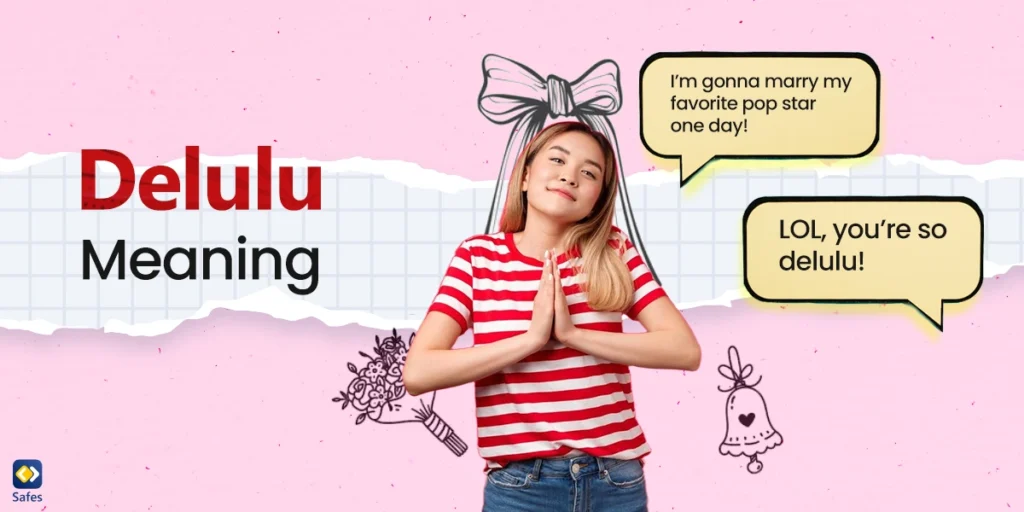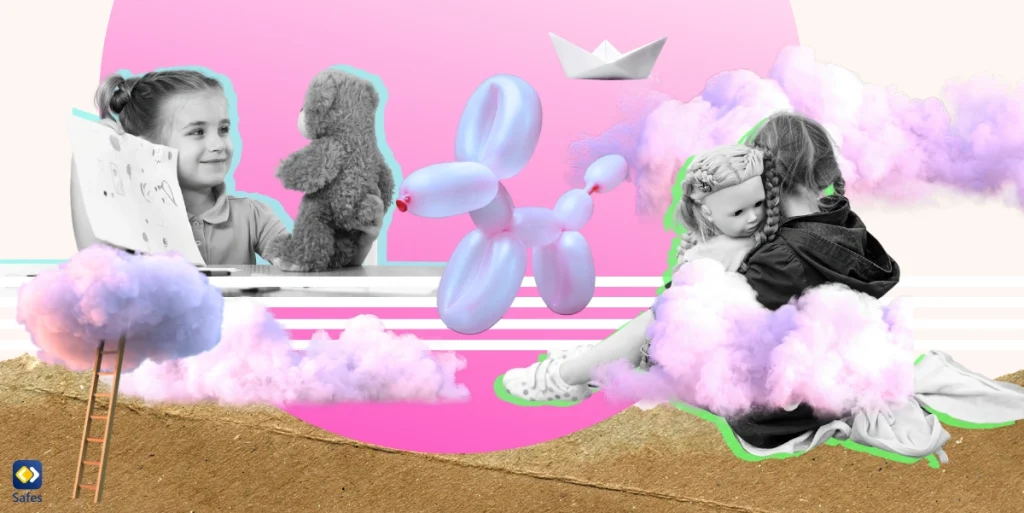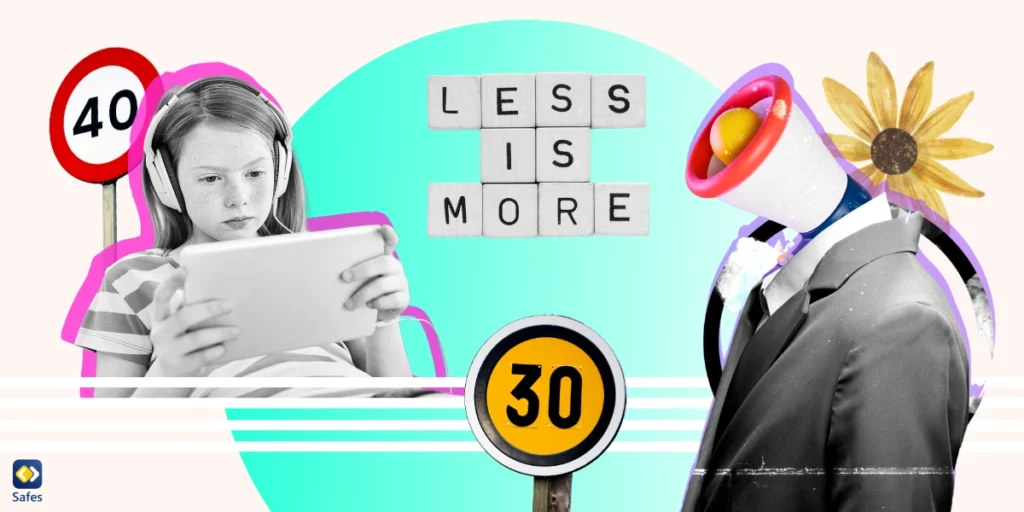What is “delulu”? In everyday slang, “delulu” is shorthand for “delusional,” is defined as someone who is out of touch with reality—often in a playful, teasing, or hyperbolic way. Although it originates from the word “delusional,” in casual digital conversations it doesn’t always refer to genuine mental health issues. Instead, it’s more commonly thrown around in jest when friends find someone’s dreams, crushes, or obsessions comically unrealistic.
Download and Start Your Free Trial of the Safes Parental Control App
Because slang evolves constantly, understanding terms like “delulu” can help parents, educators, and anyone interacting with younger generations stay up to date on what’s being shared online. While it is typically lighthearted, “delulu” can also venture into more problematic territory if used to mock or minimize real mental health challenges. In this post, we’ll break down its meaning, usage, and potential concerns.
What Does “Delulu” Mean in Slang?
As defined by Urban Dictionary, “delulu” is used to label an individual or situation that appears detached from reality. It can be directed at oneself (“I’m so delulu for thinking he’ll text back in five minutes!”) or at others (“She’s totally delulu if she thinks her TikTok will go viral overnight!”).
Over time, “delulu” has become a staple in teenage lingo—especially on platforms like TikTok, Twitter/X, and Instagram—where it commonly appears in memes and casual banter. While often harmless, it can sometimes trivialize mental health conditions or be weaponized in cyberbullying contexts.
How It’s Used in Real Digital Interactions
The term “delulu” pops up regularly in group chats and comment sections, usually with a humorous twist. However, it can also serve as a passive-aggressive remark questioning someone’s grip on reality. Here are some everyday examples:

Text Message
– Friend 1: “I’m gonna marry my favorite pop star one day!”
– Friend 2: “LOL, you’re so delulu!”
TikTok Comment Section
– Video: A TikToker talking about finally quitting their day job to become famous overnight.
– Comment: “We love the confidence, but that’s a bit delulu, don’t you think?”
Twitter/X Post
– Tweet: “I’m convinced I’ll be discovered in a coffee shop if I just keep singing out loud!”
– Reply: “Stay delulu, queen! Sometimes the universe rewards it.”
These examples show that “delulu” can be used lightheartedly (“Stay delulu!”) or as a mild insult questioning someone’s judgment.
Platform-Specific Usage
If you’re interested in what the slang term “delulu” means on TikTok and other platforms, look at the following use cases:
TikTok
- Hashtags & Trends: The hashtag #delulu is often used in comedic skits and rants where creators share their “delusional” hopes or crushes.
- Viral Memes: Trendy sound bites might feature someone proclaiming wild goals or fantasies, with commenters chiming in about being “delulu.”
- Memes & Reels: Posts often feature memes poking fun at unrealistic dating standards or big career dreams.
- Caption Fodder: Users might add “delulu” to captions that show them engaging in playful daydreams or comedic self-awareness.
Twitter/X
- Debates & Takes: Sometimes used to call out fandoms that overestimate a celebrity’s interest in them or to highlight “delusional” hot takes.
- Community Jargon: The K-pop community frequently uses “delulu” to tease fans who imagine themselves dating or befriending their favorite idols.
Discord/Gaming Chats
- Friendly Banter: Gamers might use “delulu” to mock or tease each other’s unrealistic gameplay strategies or expectations.
- Less Formal Usage: Typically remains lighthearted, aimed at playful ribbing rather than bullying.
Though widely recognized, “delulu” is still evolving. Younger users often adopt or drop slang quickly, so “delulu” may shift in tone or popularity over time.
Risk Level Indicator (Parent Alert System)
🟡 Yellow – Medium-level concern.
“Delulu” typically isn’t as intrusive or explicit as some other slang terms, but it can still raise concerns in certain contexts:
- Mocking Mental Health: Repeatedly calling someone “delusional” can be hurtful, especially if they struggle with self-esteem or actual mental health conditions.
- Minimizing Real Issues: The casual use of “delusional” may normalize dismissing genuine problems or feelings.
- Cyberbullying Potential: Like any term, it can be weaponized to shame or belittle a person online.
Parents and educators should watch for any patterns of negative usage, particularly if a child seems distressed about repeatedly being called “delulu,” or if they are self-deprecatingly using it in a harmful way.
When Parents Should Intervene:
- Noticeable Emotional Impact: If your child is upset or anxious after peers call them “delulu.”
- Bullying Patterns: If it’s part of a broader bullying scenario.
- Harmful Self-Talk: If they start referring to themselves in a negative or alarming way.
What Parents Can Do:
- Encourage Open Dialogue: Ask your child what “delulu” means to them and how it’s used in their friend groups.
- Discuss Respect & Sensitivity: Highlight the difference between harmless jokes and jokes that can cross the line.
- Use Parental Controls: Consider using apps that can alert you to specific keywords or concerning behavior online.
Trend Tracker – Is It Still Relevant?
🔥 Trending – Still widely used.
As of 2025, “delulu” continues to be a popular slang term on social media. It features in comedic skits, ironic self-descriptions, and sometimes in fandom discourse. Although its usage is widespread, it’s not always negative—many online communities embrace “delulu” as a fun way to dream big or laugh at one’s own unrealistic hopes.
Why It’s Still Popular:
- Meme & Fandom Culture: Especially among younger users who enjoy exaggerated self-awareness.
- Relatable Content: Many find comfort in joking about their “delusional” fantasies or big dreams.
- Low-Stakes Teasing: In most cases, it functions like good-humored ribbing among friends.
However, its comedic charm can wane if it’s used to trivialize or demean. Monitoring the context is key.
Online Safety Considerations
While “delulu” might not sound as alarming as explicit or sexual slang, its careless usage can still pose emotional or social risks.
Potential Risks:
- Emotional Harm: Constantly labeling someone as “delusional” can erode self-esteem.
- Normalization of Dismissiveness: The term can teach teens to dismiss or minimize genuine concerns.
- Bullying & Harassment: In extreme cases, it may be used to single someone out, especially in larger group chats or public comment sections.
How Parents Can Address This Issue:
- Foster Empathy: Encourage kids to consider how the term might affect someone’s feelings.
- Monitor Online Interactions: Keep an eye out for repeated teasing that goes beyond playful jokes.
- Set Expectations: Discuss respectful online communication, even in humor.

Safes: Helping Families Navigate Online Trends
As children and teens adapt to changing slang and meme cultures, parental control apps like Safes can help families maintain a healthy balance. By monitoring keywords, tracking social media activity, and providing content filters, Safes empowers parents to identify troubling patterns early—while still respecting a child’s independence online.
Try Safes today on iOS or Android to see how these tools can support open discussions about internet slang and responsible digital behavior.
Conclusion
“Delulu” reflects both the lighthearted world of daydreams and the complexities of online interactions. It’s become a go-to term among teens to tease unrealistic aspirations, share comedic self-awareness, or dish out a reality check. While often used in a harmless, joking manner, “delulu” can still slip into bullying or belittle genuine concerns if wielded carelessly.
By staying informed, maintaining open communication, and using resources like parental control apps, families can navigate the evolving slang landscape more confidently. Encouraging empathy and respect online remains key—and understanding and discussing a term like “delulu” can be a simple yet powerful step toward building a positive digital environment.
Your Child’s Online Safety Starts Here
Every parent today needs a solution to manage screen time and keep their child safe online.
Without the right tools, digital risks and excessive screen time can impact children's well-being. Safes helps parents set healthy boundaries, monitor activity, and protect kids from online dangers—all with an easy-to-use app.
Take control of your child’s digital world. Learn more about Safes or download the app to start your free trial today!




